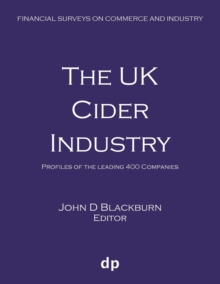
The UK Juice Industry : Profiles of the Leading 330 Companies Paperback / softback
Edited by John D Blackburn
Part of the Financial Surveys on Commerce and Industry series
Paperback / softback
Description
This study looks at all companies registered in the United Kingdom where they identify themselves as manufacturers of fruit and vegetable juice.
This study includes companies that are dormant or non-trading some of which might be latent while others may operate under their owners’ names but incorporate to protect the business name. In addition, all newly incorporated companies are included. The study will exclude those companies that do not specifically identify themselves as manufacturers of fruit and vegetable juice.
The aim of this study is to provide an overview of the key movers and shakers in the UK fruit and vegetable juice sector. Only key data has been isolated, particularly the company’s net worth and total assets, but also its full name, date incorporated, registered office, other activities, shareholders, directors (with date of birth, occupation and nationality) and number of employees.
Two indicators of size are used: net worth and total assets. These are preferable to turnover which is influenced by profit margins and whether the companies are capital or labour intensive.
In the years 2016, 2017 and 2018, new company incorporations in the fruit and vegetable juice sector were 31, 49 and 102 respectively. The UK accounts for 19% of the European juice market.
The British Fruit Juice Association (BFJA) represents the industry in the UK.
The market for bottled water and fruit juice, neither of which contain added sugar, is unaffected by the sugar levy but nonetheless they do contain naturally-occurring sugars. Despite their natural sugar content, sales of freshly squeezed juices are increasing with smoothies the fastest growing segment. Own label sales are not at a disadvantage to branded products.
100% juice is the most important factor in choosing a product. For healthy soft drinks, consumers look at sugar content, then calories, whether it is natural and whether it is fresh.
Breakdown of beverages in the UK is as follows: soft drinks (28%), beer (27%), whisky (25%), cider (7%), gin (3%), mineral water (3%) and others (2%).The breadown for non-alcoholic sector is as follows: cola £1.2 billion; pure juice £851 million; juice drinks £429 million; smoothies £223 million; plain water £616 million; squashes £406 million; traditional mixers £192 million; and fruit carbonates £405 million.
In terms of Gross Value Added (GVA) beverages (including soft drinks and mineral water) is the largest manufacturing group with a of £6.6 billion in 2015; contributing 23% to the total food and drink manufacturing GVA. The percentage UK retail price increase from June 2007 to June 2016 for soft drinks was 24% with alcoholic drinks at 17% and coffee, tea, cocoa at 36%.
Information
-
Out of stock
- Format:Paperback / softback
- Pages:50 pages
- Publisher:Dellam Publishing Limited
- Publication Date:12/03/2019
- Category:
- ISBN:9781912736164
Information
-
Out of stock
- Format:Paperback / softback
- Pages:50 pages
- Publisher:Dellam Publishing Limited
- Publication Date:12/03/2019
- Category:
- ISBN:9781912736164










